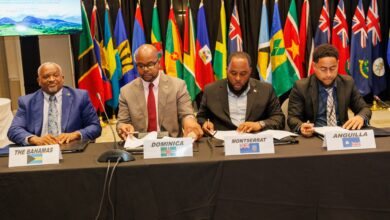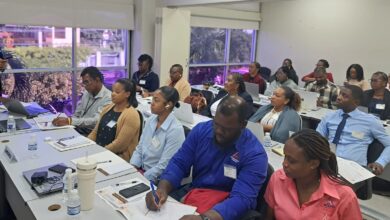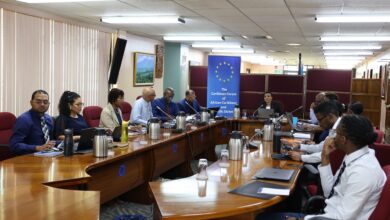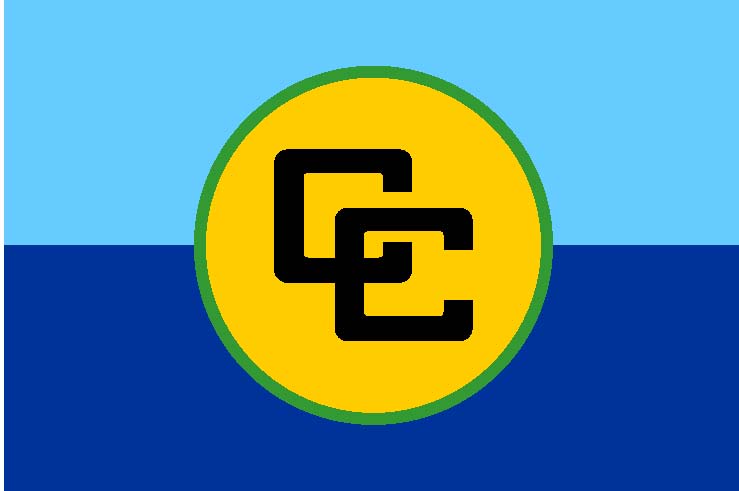The Seventh Special Meeting of the Conference of Heads of Government of the Caribbean Community was held in Chaguaramas, Trinidad and Tobago on 26-27 October 1999.
Heads of Government in attendance were: Hon. Lester B. Bird, Prime Minister and Minister of Foreign Affairs, Antigua and Barbuda; Rt. Hon. Hubert Ingraham, Prime Minister of the Commonwealth of The Bahamas; Rt. Hon. Owen Arthur, Prime Minister and Minister of Finance and Economic Development, Barbados; Hon. Edison James, Prime Minister and Minister of Legal Affairs, Labour and, Dominica; Dr the Hon. Keith Mitchell, Prime Minister of Grenada; His Excellency Bharrat Jagdeo, President of the Co-operative Republic of Guyana; His Excellency René Préval, President of the Republic of Haiti; the Rt. Hon. Percival J. Patterson, Prime Minister and Minister of Defence, Jamaica; Hon. David Brandt, Chief Minister, Montserrat; Hon. Dr. Denzil Douglas, Prime Minister and Minister of Foreign Affairs, Finance, Planning and National Security, St. Kitts and Nevis; Dr. the Hon. Kenny D. Anthony, Prime Minister and Minister of Finance, Planning and Development, Foreign Affairs, Home Affairs and Information, Saint Lucia; Rt. Hon. Sir James E. Mitchell, Prime Minister and Minister of Finance, St. Vincent and the Grenadines; H.E. Dr. Jules A. Wijdenbosch, President of the Republic of Suriname, and Hon. Basdeo Panday, Prime Minister, Trinidad and Tobago.
Belize was represented by the Hon. John Briceño, Deputy Prime Minister and Minister of Natural Resources, Environment and Industry.
Anguilla was represented by the Chief Minister, the Hon. Hubert Hughes.
The Conference observed a minute’s silence in remembrance of His Excellency Julius Nyerere, former President of Tanzania.
OPENING STATEMENT
In welcoming delegations, the Chairman extended a special welcome to His Excellency Bharrat Jagdeo, President of Guyana who was attending his first Meeting of the Conference as a Head of State. He also expressed the sympathy and support of the Caribbean Community to the Commonwealth of The Bahamas which had suffered serious damage from the passage of Hurricane Floyd.
In his Opening Remarks, the Chairman warned of the danger of the slow progress in transforming the promise of regional integration into manifest benefits for the people of the Region.
He also urged that a comprehensive, co-ordinated public education and communications programme be mounted, targeted to the widest possible regional audience, to facilitate the implementation of measures necessary to accelerate the pace of integration.
INSTRUMENTS OF THE COMMUNITY
Heads of Government noted with satisfaction that the following Member States signed various protocols amending the Treaty of Chaguaramas:
Belize – Protocol III (Industrial Policy) and Protocol V (Agricultural Policy);
Grenada – Protocol IV (Trade Policy); and
Suriname – Protocols III, IV, V, VI (Transportation Policy) and VII (Disadvantaged Countries, Regions and Sectors).
They also noted that arrangements were in place for Montserrat to sign the relevant Protocols thereby concluding the signature of all the Protocols that have so far been completed.
Two remaining Protocols (VIII – Dispute Settlement Mechanism and IX – Competition Policy) are now scheduled for completion and signature by the next Inter-Sessional Meeting of the Conference in March 2000.
They also welcomed the signing by the Commonwealth of The Bahamas of the CARICOM Agreement on Social Security, which permits the transfer of benefits accruing to nationals of signatory countries as they relocate from one country to another.
CARICOM IN THE 21ST CENTURY
Heads of Government in defining their Vision of the Caribbean Community in the early 21st century, agreed that it was first necessary to take stock and complete their unfinished agenda of the 20th century. To that end, they recalled the measures set out in the Grand Anse Declaration and Work Programme adopted in 1989 and assessed the progress made in the implementation of those measures. They also recalled the West Indian Commission Report – Time for Action – which flowed therefrom and reiterated the continuing relevance of its recommendations.
Against this background, Heads of Government issued the “Consensus of Chaguaramas” which identified the goals to be achieved and action to be taken as the Region proceeds into the 21st century. A copy of the Consensus of Chaguaramas is attached hereto.
CARIBBEAN COURT OF JUSTICE
Heads of Government underscored the centrality of the Caribbean Court of Justice in the institutional structures of the Community, including its importance to the successful functioning of the CARICOM Single Market and Economy. They noted the progress in the arrangements for establishing the Court and welcomed the assurance of the Government of Trinidad and Tobago that the accommodation and other related facilities would be ready by October 2000.
They decided to mount a regional education and public awareness campaign to sensitise all members of civil society about the role and function of the Court.
Heads of Government also mandated the Secretariat to consider the measures required for Haiti and Suriname, both of which have civil law systems as against the common law systems of the rest of the Member States of the Caribbean Community, to participate in the Caribbean Court of Justice.
EXTERNAL RELATIONS
Heads of Government received progress reports on the status of negotiations in which the Region is involved, namely, a successor agreement to the Lomé IV Convention, and the Free Trade Area of the Americas (FTAA), as well as preparations for the upcoming round of WTO negotiations. They noted the complexity of the inter-relationship among these negotiations.
They welcomed the recent breakthrough in the trade aspects of the post-Lomé IV negotiations resulting from discussions between the European Union (EU) and ACP Ministerial negotiating teams.
With respect to the FTAA negotiations, Heads of Government expressed grave concern about the seeming absence of real commitment on the part of the rest of the hemisphere to the concerns of smaller economies. In this regard, in keeping with the fundamental principle adopted in the 1994 Miami Declaration of the First Summit of the Americas, and reaffirmed in the Second Summit of the Americas in Santiago in 1998 CARICOM delegations attending the forthcoming FTAA Ministerial Meeting in Toronto were mandated to insist that the inclusion of the special and differential treatment for small economies be part of the programme of each negotiating group before the launch of actual negotiations.
With regard to the WTO negotiations, Heads of Government endorsed the strategic approach to be pursued by CARICOM at the WTO Ministerial Meeting in Seattle, as recommended by the Prime Ministerial Sub-Committee, on the basis of submissions from the Regional Negotiating Machinery (RNM).
Heads of Government expressed their appreciation to the RNM for its contribution in advancing the position of the Region in the various multi-lateral negotiations in which it is engaged.
BANANAS
Heads of Government noted the continuing effort to find a satisfactory resolution to the problems associated with the marketing of Caribbean bananas in Europe following the decision by the WTO with respect to the European Union Banana Import Regime. The leaders supported the proposal of the Hon Prime Minister of Dominica to seek an urgent meeting with the United States Trade Representative to advance the process.
FINANCIAL MATTERS
Heads of Government of those CARICOM States which are also members of the Inter-American Development Bank (IDB) reiterated their commitment to facilitating the accession of the OECS States to membership of the Bank , as a group. To this end, they agreed to cede shares to the OECS and to take all other steps necessary to ensure that the aspiration of the OECS States is realised in the shortest possible time.
Heads of Government endorsed the decision of the Council for Financing and Planning (COFAP) to institutionalise the monitoring of prudential and supervisory regulations and to update legislation relating to the financial sector in the Region, in order to ensure compliance with best practices and international standards.
MONTSERRAT
Heads of Government expressed appreciation at the completion of 15 houses (Phase1) of the CARICOM Village in Montserrat and noted the gratitude expressed by the Chief Minister of Montserrat. Heads of Government also expressed their thanks to the Governments of Barbados and Jamaica and the Caribbean Development Bank for their roles in ensuring the completion of the houses.
Heads of Government mandated the CARICOM Secretariat to collaborate with the Government of Montserrat in the preparation of a project for the completion of Phase II of the Housing project.
THE POLITICAL SITUATION IN GUYANA
Heads of Government received a draft preliminary report from Dr. the Hon. Kenny Anthony, Prime Minister of Saint Lucia, and Head of Government with responsibility for overseeing the Implementation of the Herdmanston Accord and the Saint Lucia Statement. They welcomed the progress made to date on constitutional reform.
As regards the question of political dialogue, Heads of Government called on President Bharrat Jagdeo and Mr. Desmond Hoyte to meet at the earliest possible time without conditions. Heads of Government also expressed the need for greater involvement by the wider civil society in helping to resolve the present situation.
Heads of Government also agreed to extend the services of the Facilitator up to the end of the current year.
GUYANA-VENEZUELA RELATIONS
Heads of Government noted that 3 October 1999 had marked the 100th Anniversary of the Paris Arbitral Award by which the existing boundary between Guyana and Venezuela was defined by unanimous judgement.
They also viewed with concern the fact that Venezuela had reiterated its contention that the Arbitral Award of 1899 is null and void and continues to advance its claim to the Essequibo region of Guyana.
Heads of Government further noted the commitment of the two countries to the good offices process of the United Nations Secretary-General.
In this regard, Heads of Government fully endorsed the RESOLUTION approved by the Assembly of Caribbean Community Parliamentarians in Grenada on 15 October 1999, a copy of which is appended to this Communique.
They reiterated their firm support for the sovereignty and territorial integrity of Guyana and their desire for a peaceful settlement to the controversy.
HAITI
The Prime Minister of St. Vincent and the Grenadines reported to Heads of Government on the mission to Haiti which he conducted on their behalf. During the visit the Mission met with Political Parties, Groups and Civic Organisations, which expressed their own views and descriptions which are neither supported nor endorsed by Heads of Government.
The Heads of Government noted that the registration of electors was urgent and was a key prerequisite for the holding of elections in Haiti.
They commended the Mission on its work and agreed that the team led by Sir James Mitchell would continue to monitor the situation in Haiti and should return to establish the areas in which the Community could provide support.
Heads of Government also agreed to urge the International Community to remain engaged in Haiti as that country seeks to consolidate previous gains and to execute a programme leading to free and fair elections.
EASTERN CARIBBEAN FISH KILL
Heads of Government expressed concern about the recent fish kill in the Eastern Caribbean and its negative effect on the tourism and fisheries industries. They noted the report of the Meeting of the Technical Experts held in Barbados on 16 October and mandated the Secretariat to continue to follow-up this matter, particularly with the international scientific community, in order to determine the cause of this incident and identify measures which might be taken to prevent a recurrence.
WEST INDIES CRICKET
Heads of Government reiterated the continuing importance of cricket to the ethos identity and development of the Community. They endorsed the convening of a CARICOM/UWI Regional Cricket Conference. Activities in that regard will be launched in January 2000 and will continue throughout the cricket season, culminating in a Plenary Session at UWI, Barbados, on 8-11 May 1999. National conferences will be held in each CARICOM Member State, the conclusions of which will be tabled at the final plenary. They noted that the Government of Barbados has offered to fund the Regional Steering Committee and the Final Plenary in Barbados. They underscored that the conference which will bring together all interests groups will have as its main objective the formulation of realistic and practical proposals for the present and future development of West Indies cricket.
LEEWARD ISLAND AIR TRANSPORT (LIAT)
Heads of Government received a report on the state of the regional airline LIAT. They expressed their serious concern over the present difficulties which threaten the continued survival of this vital regional air service. They agreed to hold within a week in Saint Lucia, an urgent meeting of officials of shareholder states of LIAT, to determine future action.
IBERO-AMERICAN SUMMIT
Heads of Government agreed that the President of the Republic of Suriname, His Excellency, Jules Wijdenbosch, will represent the Caribbean Community at the Ibero-American Summit to be held on 15-16 November 1999, in Havana, Cuba
APPRECIATION
Heads of Government, having returned to the birth-place of the Community, expressed their deep appreciation for the inspiration which it imparted to their deliberations as they sought to chart the course for the Community in the forthcoming century. They thanked the Government and people of Trinidad and Tobago for this opportunity and for the generous hospitality extended to them for the second time in 1999.
Attachment I
CONSENSUS OF CHAGUARAMAS
The Conference of Heads of Government of the Caribbean Community meeting in its Seventh Special Session at Chaguaramas, Trinidad and Tobago on 26-27 October 1999;
Having deliberated on a Vision for the future of the Region, and recognising the need for ensuring that the integration of the Region must be made more meaningful for its people, especially the Youth, adopted the Consensus of Chaguaramas as follows:
- Heads of Government noted that the choice of Chaguaramas, the cradle of the Community as the location of this meeting was most propitious;
- The Heads of Government recalled the landmark document, The Declaration of Grand Anse, which was signed at the Tenth Meeting of the Conference at Grand Anse, Grenada, July 1989 and which set out the path for the Community towards the 21st century: They noted the achievement of the following goals set out therein:
(a) The revision of two Common Market Instruments, namely, the Common External Tariff and the Rules of Origin;
- Strengthened Customs Co-operation and Customs Administration;
- Provision (in Protocol II) for the free movement of capital and its facilitation by cross-listing and trading of securities in the existing three stock exchanges (Barbados, Jamaica and Trinidad and Tobago);
- Establishment of a Caribbean Investment Fund to provide equity and venture capital;
- Arrangements for the free movement of skilled and professional persons;
- Intensification of joint representation in international economic negotiations;
- Establishment of an Assembly of Caribbean Community Parliamentarians;
- Establishment and completion of the work of the Independent West Indian Commission;
- Creation of a Council for Finance and Planning and a Committee of Governors of Central Banks to enhance consultation, cooperation and coordination on economic policies;
- Removal of barriers to trade in goods;
- Establishment of the regional legal framework for the provision of air and sea transportation (Protocol VI).
- Heads of Government also noted that two key elements of the Grand Anse Declaration – the Single Market and Economy and the Caribbean Court of Justice – are close to completion. In recognising that the legal framework for the Single Market and Economy would soon be in place, they accepted the offer of Barbados to host a special consultation on implementing the Single Market and Economy.
The Heads of Government recognised that there were some goals still to be achieved and set the timeframe of 1 January 2001 for substantial progress in the following areas:
(i) Governance of Regional Institutions;
(ii) Regional Human Resource Development ;
(iii) Labour Mobility;
(iv) Science and Technology development;
(v) Regional Food Security;
(vi) Regional Financial Institutions;
(vii) Cultural co-operation and development;
(viii) Harmonised development of our services sector;
(ix) Regional Programmes to combat HIV/AIDS and Drugs;
(x) Regional Programme for the Development of Sports.
In furtherance of this and recognising that Lead Heads of Government had already been assigned responsibilities for the Single Market and Economy; External Negotiations; Science and Technology; Labour Mobility; and Monetary Union, agreed that Lead Heads of Government would be appointed to spearhead developments in the following areas:
- Services
- Environment
- Human Resource Development
- Information Technology and Telecommunications
- Justice and Governance
- Sports and Culture
- Agriculture
- Tourism
Heads of Government also agreed to explore the issuance of a common passport for CARICOM citizens, for adoption by the year 2001. This passport will be a defining symbol of regionalism and offer to the Caribbean people a tangible demonstration of their identity as members of the Caribbean family.
Heads of Government, recognising the important role of civil society in the ongoing integration process, also agreed to convene in the year 2000, an encounter catering for the widest possible participation, under the theme Forward Together. This forum will provide for a free and wide-ranging interchange of ideas aimed at arriving at a consensus for a strategy for the development of the Region and its peoples.
Heads of Government further agreed that in this spirit, the Political Opposition should be brought in as partners into the framework of the consultation in the regional integration process.
Heads of Government agreed to review the structure and functioning of the institutions of the Community, including its Secretariat, with a view to better equip them with the necessary authority and capacity to discharge their responsibilities, as the Region seeks to accelerate decision-making and implementation in the regional integration process.
They entrusted the Bureau of the Conference of Heads of Government, with the responsibility of overseeing the review and restructuring process, the result of which will be considered at the Eleventh Inter-Sessional Meeting in March 2000.
Attachment II
ASSEMBLY OF CARIBBEAN COMMUNITY PARLIAMENTARIANS
WHEREAS Venezuela continues to advance her claim to the Essequibo Region of Guyana, a claim which amounts to no less than five-eighths of Guyana’s territory;
AND WHEREAS this claim completely disregards the fact that the existing boundary was defined by the unanimous judgment of an international arbitral tribunal given in Paris in 1899, and jointly demarcated on the ground by officials of the United Kingdom and Venezuela and accepted thereafter by the international community as both the de facto and de jure boundary between Guyana and Venezuela;
NOTING that following continued agitation by Venezuela, the Geneva Agreement signed on February 17, 1966 between the United Kingdom, British Guiana and Venezuela established a Mixed Commission of Guyanese and Venezuelan representatives charged with the task of seeking a satisfactory solution for the peaceful settlement of the controversy between Venezuela and the United Kingdom which had arisen as the result of the Venezuelan contention that the Arbitral Award of 1899 about the frontier between British Guiana and Venezuela is null and void;
NOTING the failure of the Mixed Commission and the further agreement by Guyana and Venezuela within the context of Article IV(2) of the 1966 Geneva Agreement to refer the decision as to the means of settlement to the Secretary-General of the United Nations;
NOTING that the relations between the two countries have been conducted over recent years in an atmosphere of mutual understanding and respect and through the development of programmes of functional co-operation;
FURTHER NOTING the commitment of the two countries to the good offices process of the UN Secretary-General;
RECOGNISING the consistent and firm support of the Member States of the Caribbean Community for the territorial integrity and sovereignty of Guyana and their stated desire for a peaceful settlement to the controversy between Guyana and Venezuela;
BE IT RESOLVED THAT the Assembly of Caribbean Community Parliamentarians urge the Governments of the Community to reiterate their unwavering support for and solidarity with the Government of Guyana in the face of the controversy;
BE IT FURTHER RESOLVED THAT this Resolution be communicated to the Conference of Heads of Government of the Caribbean Community.
Approved by the Assembly of Caribbean Community Parliamentarians, Grenada, this 15th day of October, 1999.




